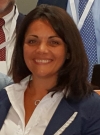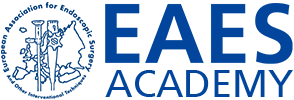O.S.A.T.S. System :Objective Structured Assessment of Technical Skill.
Italian Society of Surgery School: Our Experience.
EAES Academy. esposito m. 07/05/22; 366521; P238

Prof. Dr. maria grazia esposito
Contributions
Contributions
Abstract
In the last five years in the framework of the activities of the Italian Society of Surgery School on: "Technological innovation: clinical aspects and research methodology", a structured surgical training was proposed.
Every year 15 post-graduate students and new surgical specialists underwent a full-intensive surgical training on minimally invasive techniques.
Structured from single tasks to most complex procedures, with a clear procedural step-by-step protocol of increasing difficulties, starting from a dry laparoscopic simulator, then moving to the Wet Lab, and finally to the Animal Lab and Robotic VR Lab. The OSATS system (Objective Structured Assessment of Technical Skill) was used to monitor them while performing the exercises.
Learners tutored by menthors on every single task of the three day -full immersion- course.
The results of the the students were compared. The learners who carried out procedural step-by-step protocol of increasing difficulties , showed a better result in time and effectiveness of implementing advanced skills.The results were statistically evaluated by mean of time spending during the exercises eye -hand coordination and bimanual coordination, showing that the consequentiality of the exercises, performed with increasing difficulty, reduces the execution time and improves the performance of the surgeon. The use of the OSATS system allows to measure the shortcomings of the Students in order to suggest the indications for the improvement of the technique.
The authors propose to suggest with their experience of about 5 years a validated system of teaching and objective judgment of surgical training. It could be an objective method of surgical evaluation of the post Covid era, compared with the results obtained in the pre-Covid years.
Every year 15 post-graduate students and new surgical specialists underwent a full-intensive surgical training on minimally invasive techniques.
Structured from single tasks to most complex procedures, with a clear procedural step-by-step protocol of increasing difficulties, starting from a dry laparoscopic simulator, then moving to the Wet Lab, and finally to the Animal Lab and Robotic VR Lab. The OSATS system (Objective Structured Assessment of Technical Skill) was used to monitor them while performing the exercises.
Learners tutored by menthors on every single task of the three day -full immersion- course.
The results of the the students were compared. The learners who carried out procedural step-by-step protocol of increasing difficulties , showed a better result in time and effectiveness of implementing advanced skills.The results were statistically evaluated by mean of time spending during the exercises eye -hand coordination and bimanual coordination, showing that the consequentiality of the exercises, performed with increasing difficulty, reduces the execution time and improves the performance of the surgeon. The use of the OSATS system allows to measure the shortcomings of the Students in order to suggest the indications for the improvement of the technique.
The authors propose to suggest with their experience of about 5 years a validated system of teaching and objective judgment of surgical training. It could be an objective method of surgical evaluation of the post Covid era, compared with the results obtained in the pre-Covid years.
In the last five years in the framework of the activities of the Italian Society of Surgery School on: "Technological innovation: clinical aspects and research methodology", a structured surgical training was proposed.
Every year 15 post-graduate students and new surgical specialists underwent a full-intensive surgical training on minimally invasive techniques.
Structured from single tasks to most complex procedures, with a clear procedural step-by-step protocol of increasing difficulties, starting from a dry laparoscopic simulator, then moving to the Wet Lab, and finally to the Animal Lab and Robotic VR Lab. The OSATS system (Objective Structured Assessment of Technical Skill) was used to monitor them while performing the exercises.
Learners tutored by menthors on every single task of the three day -full immersion- course.
The results of the the students were compared. The learners who carried out procedural step-by-step protocol of increasing difficulties , showed a better result in time and effectiveness of implementing advanced skills.The results were statistically evaluated by mean of time spending during the exercises eye -hand coordination and bimanual coordination, showing that the consequentiality of the exercises, performed with increasing difficulty, reduces the execution time and improves the performance of the surgeon. The use of the OSATS system allows to measure the shortcomings of the Students in order to suggest the indications for the improvement of the technique.
The authors propose to suggest with their experience of about 5 years a validated system of teaching and objective judgment of surgical training. It could be an objective method of surgical evaluation of the post Covid era, compared with the results obtained in the pre-Covid years.
Every year 15 post-graduate students and new surgical specialists underwent a full-intensive surgical training on minimally invasive techniques.
Structured from single tasks to most complex procedures, with a clear procedural step-by-step protocol of increasing difficulties, starting from a dry laparoscopic simulator, then moving to the Wet Lab, and finally to the Animal Lab and Robotic VR Lab. The OSATS system (Objective Structured Assessment of Technical Skill) was used to monitor them while performing the exercises.
Learners tutored by menthors on every single task of the three day -full immersion- course.
The results of the the students were compared. The learners who carried out procedural step-by-step protocol of increasing difficulties , showed a better result in time and effectiveness of implementing advanced skills.The results were statistically evaluated by mean of time spending during the exercises eye -hand coordination and bimanual coordination, showing that the consequentiality of the exercises, performed with increasing difficulty, reduces the execution time and improves the performance of the surgeon. The use of the OSATS system allows to measure the shortcomings of the Students in order to suggest the indications for the improvement of the technique.
The authors propose to suggest with their experience of about 5 years a validated system of teaching and objective judgment of surgical training. It could be an objective method of surgical evaluation of the post Covid era, compared with the results obtained in the pre-Covid years.
{{ help_message }}
{{filter}}


